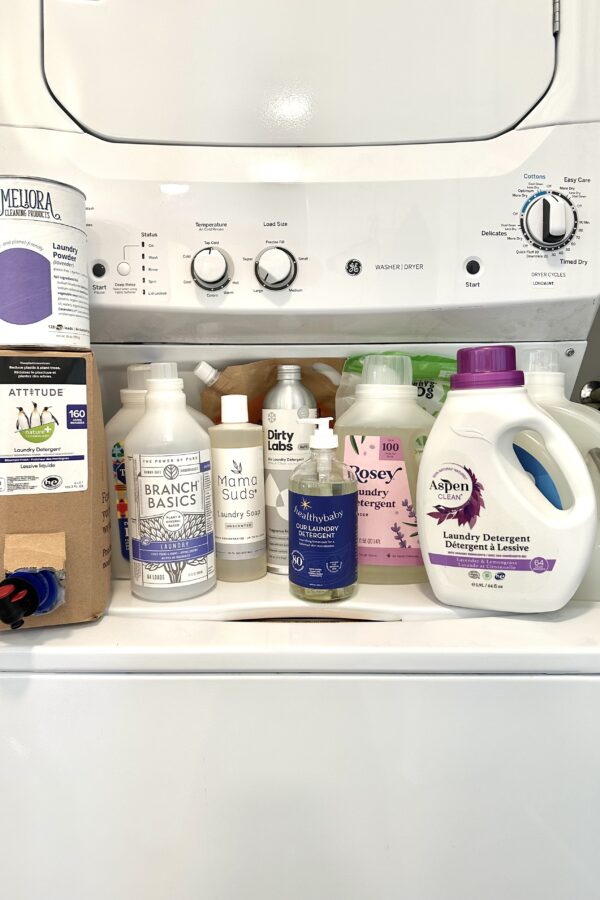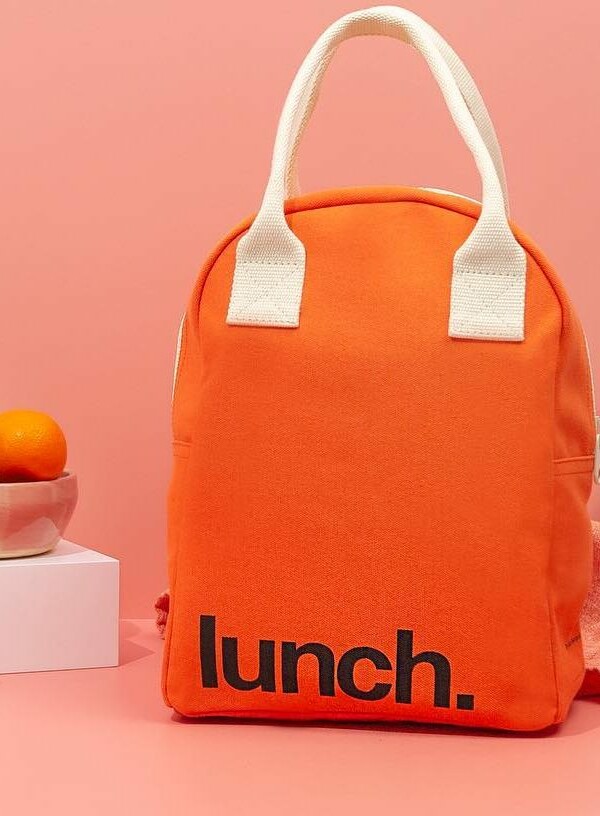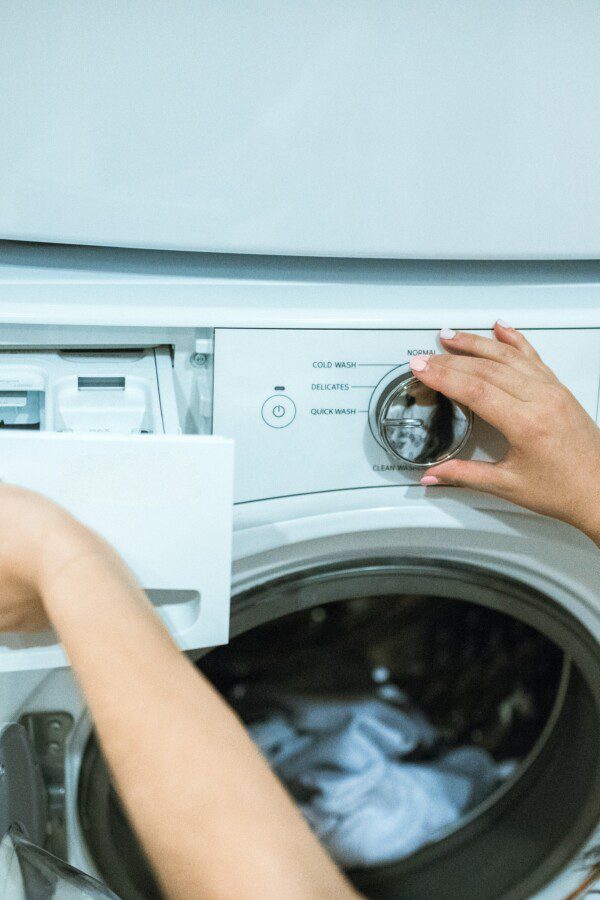Looking for the best non-toxic reusable alternatives to ziploc bags? Our favorite reusable sandwich bags, snack bags, and food storage solutions below will help you store your food in safer containers and cut down on plastic waste.
From food wraps and silicone bags to 100% organic cotton options, there’s something for every type of snacker.
Table of Contents
- What’s Wrong with Plastic Ziploc Bags, Anyway?
- Why Choose Non-Toxic Reusable Alternatives To Ziploc?
- The Best Materials to Look For in Safer, Reusable Ziploc Bags & Snack Bags
- 1. Silicone Food Storage Bags
- 2. Reusable Beeswax Wraps
- 3. Organic Cotton Fabric
- 4. Disposable Paper Bags
- 5. Glass or Stainless Steel Containers
- How Do Non Toxic Reusable Snack Bags Compare In Terms of Convenience?
- Our Favorite Non-Toxic Alternatives To Ziploc Bags for 2023
- Stasher (Reusable Silicone Bags)
- Bee’s Wrap (Reusable Beeswax Food Wraps)
- If You Care (Disposable Alternatives to Ziploc Bags)
- No Trace Shop (Organic Cotton Reusable Sandwich & Snack Bags)
- The Next Best Options for Ziploc Bag Alternatives
- FAQs
- Are Ziploc bags BPA-free?
- Can you put Ziploc bags in the microwave?
- How long do Ziploc bags take to decompose?
- Can you recycle Ziploc bags?
- Wrapping up: Best Alternatives To Ziploc Bags
This article contains affiliate links, which means we may earn a commission if you decide to make a purchase.
Featured Image Credit: Stasher
What’s Wrong with Plastic Ziploc Bags, Anyway?
First, a quick note: Although Ziploc is a specific brand, we’re going to use “Ziploc bags” to refer to any of those thin plastic disposable baggies.
1. Potentially Toxic Plasticizers
We’ve talked before about how plastic food storage containers can be toxic to the end user because plastic chemicals can leach out of the container and into the food.
The question of whether or not Ziploc bags are toxic depends on whether we’re talking about specific chemicals that may be in plastic sandwich bags (like BPA or DEHP, which is a phthalate), or whether we’re talking about the plastic itself.
Ziploc bags (as well as comparable snack bags from other brands) are most commonly made out of polyethelene, aka PET.
On one hand, PET is one if the “better” kinds of plastics compared to something like PVC. It’s not made using BPA (as Ziploc proudly states on their packaging) or other bisphenols, and it’s often free from phthalates as well. (However, Ziploc does not explicitly say their bags are phthalate-free and they could technically still be added to make the plastic more pliable.)
While this is somewhat relieving for customers, it may not tell the whole story.
Why Choose Non-Toxic Reusable Alternatives To Ziploc?
First, there are lots of other toxicants that plastic could contain, such as heavy metals, styrene, benzene, formaldehyde, and others. It’s not always entirely clear what exactly is in plastic products, either intentionally or as a contaminant. And there hasn’t been very much testing on sandwich bags specifically. So there are quite a few unknowns here.
Recent research suggests that it’s not just specific chemicals in plastic products that have the potential to cause problems, but also the plastic itself. (Or at least, a combination of many different chemicals that make up plastic.)
Then there is the issue of using recycled plastics for sandwich bags, which Ziploc has started doing more of. Although using recycled materials seems better from an environmental standpoint, some scientists say that food packaging made from recycled plastics are not safe.

2. Plastic Waste
When we zoom out, there is the plastic waste issue. Ziploc bags are single-use (for the most part), largely non-recyclable, and non-biodegradable. In fact, It takes about 1,000 years for a plastic bag to degrade in a landfill, and even then, it will just break into microplastic pieces that pollute the soil and waterways.
That’s why most of the options below are either reusable and/or compostable.
3. Money
The final thing to consider when switching from disposable to reusable Ziploc bags is the money you could save over time. Yes, reusable options are an investment, but in the long run, it will add up to sustainable savings (and you don’t have to worry about constantly restocking, either).
Not only that, but the best eco-friendly alternatives are also more durable, so you have to worry less about things like leaks and rips.
The Best Materials to Look For in Safer, Reusable Ziploc Bags & Snack Bags
Before we get to our favorite brands for eco-friendly alternatives, let’s do a quick rundown of the primary materials you’ll want to look for (instead of plastic):
1. Silicone Food Storage Bags
Silicone is one of the best sustainable alternatives because it feels and acts the most like plastic, so there is virtually no learning curve. Although some cheap silicone can be mixed with plastic fillers, high-quality 100% silicone is pretty safe.
There is some research that suggests silicone may have hormone-disrupting properties when it gets really hot, but this shouldn’t be an issue when it comes to storing snacks, sandwiches, etc. Even your dishwasher and microwave probably don’t get hot enough to cause problems with 100% silicone, but if you want to take the precautionary principle on that part, you can certainly just hand wash your silicone baggies and keep them out of the microwave/oven.
Silicone is also a good option because it’s naturally water- and grease-resistant without having to add any extra chemicals, plastics, or other materials to it. It’s also more resistant to mold and mildew compared to an alternative like organic cotton.
Silicone baggies are also very durable and should last you a really long time. However, the downside is that whenever they do reach the end of their life, they cannot be composted.
2. Reusable Beeswax Wraps
Many zero-wasters have fallen in love with beeswax wraps in recent years. These flexible and eco-friendly wraps are mostly made with cotton fabric coated in beeswax, tree resin, and plant oils (although the specific formulation will vary from brand to brand).
Simply warm them up with your hands, wrap them around your food, and they’ll mold and seal to create a tight barrier that will keep your food fresh. Although they do pretty well with greasy or oily food, you won’t be able to put pure liquid in them, since they don’t totally seal up the way zipper baggies do.
Although they can be reused many times, beeswax wraps don’t last quite as long as silicone ones. If you use them regularly and take care of them, they should last you about a year. But then the good thing is that you can easily compost them at home when you’re finished with them!
Plus, they come in a variety of fun patterns and designs that’ll add a pop of style to your kitchen.
3. Organic Cotton Fabric
You can also go with organic cotton fabric for your Ziploc bag alternative, which has pros and cons. Obviously, organic cotton is healthier than plastic and can be reused for years and years.
The main downside is that it isn’t naturally water- or grease-resistant. So you either have to get one that’s lined with an extra additive (which is usually some sort of plastic), or you have to get an unlined one, which can’t be used to store liquids.
That being said, most organic cotton baggies are machine washable, making them easy to clean!
4. Disposable Paper Bags
If, for some reason, you need a disposable, single-use baggie, kraft paper is a good plastic-free option. Some paper bags are uncoated/unlined, while others may come with a lining that may be either natural or synthetic. Uncoated ones mean fewer materials to worry about, but coated ones will be more resistant to grease and leaks. So just make sure to check the details before buying so you know what you’re getting.
The other thing to consider is that many paper bags don’t have a zip or other sealant on the top (although you can always fold them over and close them with a sticker!).
5. Glass or Stainless Steel Containers
For those looking for a sturdier option, glass or stainless steel containers are the way to go. These rugged champions come in different shapes and sizes, perfect for packing sandwiches, salads, or leftovers. They’re durable, easy to clean, and can handle the wear and tear of everyday life. Here’s a list of our favorite plastic-free food storage containers!
Of course, many people will use a variety of products and materials to store different kinds of food for different purposes. So don’t be afraid to mix it up!
How Do Non Toxic Reusable Snack Bags Compare In Terms of Convenience?
First, reusable bags much more durable than your standard plastic Ziploc bags because they are typically made from sturdy materials like silicone or fabric. They can withstand repeated use, making them reliable for various purposes.
Unlike plastic ziploc bags, reusable options are generally easy to clean. Most silicone and fabric bags are dishwasher safe, while others can be hand-washed or even thrown in the washing machine. This saves you time and effort compared to constantly restocking and disposing of single-use Ziploc bags.
Some may find it less convenient that you have to wash your baggie after each use instead of just popping it in the trash can, but most of the time, it really just comes down to a slight change in habits.
Of course, there will probably be times when using a disposable option just makes more sense. For example, if there is a situation where you are giving the baggies away and won’t be getting them back, then you might not want to invest in reusable ones. We’ve included a couple of options for plastic-free (or low-plastic) disposable options below as well.
Our Favorite Non-Toxic Alternatives To Ziploc Bags for 2023
Whether it’s for a sandwich, a granola bar, frozen meal prepping, snacks for your kids to take to school, or even leftovers, the best non-toxic and plastic-free food storage baggies can get the job done. Here are our favorite brands for storing food without plastic Ziploc bags:
Stasher (Reusable Silicone Bags)

Materials: Platinum, food-grade silicone
Reusable? Yes
Home Compostable? No
Made in: China
You probably know about Stasher—it’s one of the most well-known brands for reusable food storage bags. They’ve got a huge lineup of easy-to-use food storage solutions in various shapes and sizes: silicone sandwich bags, snack baggies, half gallons, stand-up bags, bowls, and more. They’re also probably the lowest barrier to entry because they are very similar to Ziploc bags in terms of how they can be used.
Designed to minimize plastic as much as possible, these versatile and sustainable reusable zipper bags are made of 100% platinum food-grade silicone (no plastic fillers here!), exceeding both FDA and EU standards. Of course, they’re free from things like BPA, BPS, lead, phthalates, latex, and other unwanted toxicants.
They do use dyes and colorants in many of their bags (which are food-safe and FDA-approved), but if you don’t feel comfortable with that, they have plenty of clear options you can get instead!
Stasher Bags are also one of the best freezer bag alternatives, as they stay sealed and don’t take up very much space. They are also microwave and dishwasher-safe.
Although their bags are made in China, the Stasher team works closely with an SA8000-certified factory, which ensures ethical production practices and living wages. The factory is audited yearly and the certification is overseen by the Global Living Wage Coalition and the Anker Living Wage Research Institute.
To top it all off, because silicone isn’t biodegradable, Stasher takes responsibility for the lifecycle of their bags by partnering with TerraCycle. Your bag should last a really long time (even decades if you care for it correctly), but things happen! If your bag reaches the end of its life, you can just email [email protected], and they will send you a free shipping label to TerraCycle. This helps you recycle your silicone bags with no extra charge and minimal effort.
Bee’s Wrap (Reusable Beeswax Food Wraps)


Materials: GOTS-certified organic cotton, beeswax, plant oil, tree resin. (They also have a vegan version made with candelilla wax instead of beeswax.)
Reusable? Yes
Home Compostable? Yes
Made in: Vermont, USA
Time to ditch plastic wrap and add some fresh color to your kitchen! Bee’s Wraps are one of the best zero-waste alternatives to Ziploc bags, especially since they are truly compostable at the end of their life.
With just the gentle touch of your hands, these non-toxic and plastic-free reusable wraps form to various food items, eliminating the need for tin foil or plastic. You can wrap anything from fruits and veggies to sandwiches and snacks, or use them to cover and store leftovers.
But in addition to their standard wraps, they also have a collection of sandwich and snack bags, too!
When you are done, simply wash these reusable beeswax food wraps in cool water with mild dish soap and let them air dry. If you’re using them regularly and taking care of them as directed, they last about a year.
Crafted from GOTS certified organic cotton, each wrap is coated with a blend of beeswax, tree resin, and jojoba oil. This combo not only helps your food stay fresh but also makes sure the wrap stays malleable and can be used repeatedly. They also have a vegan line of wraps, which uses candelilla wax, soy wax, and organic coconut oil instead of beeswax.
To top it all off, Bee’s Wrap proudly holds a B Corp certification and is also a member of Green America and 1% For the Planet.
If You Care (Disposable Alternatives to Ziploc Bags)


Materials: Paper from unbleached pulp
Reusable? Not really
Home Compostable? Yes
Made in: Various countries
If you need disposable sandwich or snack bags for some reason, If You Care is a good option. They’re made in Sweden out of unbleached paper pulp sourced from Scandinavian spruce trees.
Instead of using additives, If You Care makes these bags greaseproof by using a specific grind for the pulp. This makes them suitable for things like nuts, potato chips, cookies, and sandwiches with butter, mayonnaise, or oil.
Unlike many other reusable Ziploc bag alternatives on the market, these bags are uncoated, meaning they are not treated with petroleum-based paraffin wax, soy, or any other type of wax. Plus, the chlorine-free manufacturing process ensures that no chlorine or chlorine derivatives are released into the air or waterways.
The main downside to these bags is that they don’t have a zippered seal, so they just have to be folded down at the top. This means they won’t be suitable for all kinds of storage (especially liquids), and they won’t keep your food fresh for as long as something like a Stasher bag.
If You Care also carries other kitchen and food storage products, like aluminum foil and PFAS-free parchment paper.
No Trace Shop (Organic Cotton Reusable Sandwich & Snack Bags)


Materials: 100% organic cotton
Reusable? Yes
Home Compostable? Yes
Made in: Santa Cruz, CA, USA
Perfect for carrying snacks in your lunch bag or backpack or picking up something small on the go, these zero-waste snack and sandwich bags are handmade in Santa Cruz, California.
They are made out of 100% organic cotton fabric and are not lined with any additives. This has pros and cons: it means you don’t have to worry about any toxins leaching into your food, and it also means they’re completely machine-washable. However, the bags probably won’t be suitable for super wet or oily foods, as the liquid will likely seep through the fabric.
The baggies come in two sizes: snack or sandwich. They also have complementary products, like lunch bags, hand towels, bulk bags, and more. And for the best part, they have lots of fun colors and prints for both adults and kids.
The Next Best Options for Ziploc Bag Alternatives
The next several brands didn’t make our “best of” list (and we’ll tell you why), but they’re still pretty good options.
Lunchskins (Disposable and Reusable Options)


Materials: Paper or fabric with PU lining (depends on which product you choose)
Reusable? They have both disposable and reusable options available
Home Compostable? Depends on the specific product
Made in: Unknown (we’ll update when we hear back from them!)
Lunchskins has a few different options for more eco-friendly alternatives to Ziploc bags.
First, they have disposable & compostable bags that come in several different sizes and are made out of premium grease-resistant kraft paper that’s FDA food-safe, FSC-certified, and PFAS-free. These ones are wide-pleated, so you can fit quite a lot of food in them, but they do not seal on their own.
For the second option, they have Recyclable + Sealable Paper Bags, which are made from FSC-certified glassine, which is a different and more durable kind of paper. Unlike the compostable ones, these ones have a peal-away sticker on them so they can be sealed. It’s worth noting that even though Lunchskins says these are recyclable, it definitely depends on how they’re recycled and what your local facility is capable of.
For the third option, they have reusable bags, which are made out of fabric, a Velcro seal, and a polyurethane (PU) lining to make them greaseproof. Even though Lunchskins says these bags are dishwasher safe, we recommend hand-washing them in order to minimize potential PU leaching.
The other good thing about Lunchskins is that they can be found at big box stores like Target, so it can be a good option if you need to grab something quick.
Fluf (Reusable Sandwich & Snack Bags)


Materials: Certified organic cotton with an RPET lining
Reusable? Yes
Home Compostable? No
Made in: India
Fluf’s reusable Ziploc bag alternatives are very practical: they seal at the top (either with a zipper or Velcro), are machine-washable, can be reused countless times, and of course significantly reduce waste compared to disposable alternatives. Plus, they come in many fun and playful designs that will work for kids and adults.
The outer part of the bag is made of 100% GOTS certified organic cotton fabric and low-impact dyes, and then the inside is lined with post-consumer RPET plastic. This obviously is not ideal, but from a practical standpoint, it does make the bag water- and grease-resistant (without PFAS).
In terms of other types of toxicants though, you don’t have to worry. Fluf actually tests their bags to make sure they’re free from BPA, PVC, PFAS, phthalates, heavy metals, azo dyes, fire retardants, formaldehyde and more.
They also carry lunch bags, backpacks, and totes as well. Everything is made ethically in a GOTS certified factory in India.
FAQs
Are Ziploc bags BPA-free?
Yes, Ziploc bags are BPA-free, as you’ll see on most of their packaging these days. Be aware, however, that some may consider this greenwashing. Ziploc bags are made out of a flexible polyethelene (PET), which is pretty much always BPA-free. So it’s kind of irrelevant.
Can you put Ziploc bags in the microwave?
Ziploc says their bags are microwave safe, but we don’t recommend putting any plastic containers in the microwave if you can help it. Any plastic chemicals in that bag that could be toxic are more likely to leach into your food when exposed to heat. If you need to heat up your food, we recommend transferring it to a different bowl or plate made of glass, ceramic, or some other more inert material.
How long do Ziploc bags take to decompose?
Unfortunately, because they’re made of plastic, Ziploc bags to not really biodegradable. Under certain conditions, they will eventually break down, but they won’t actually decompose. Instead, they will just turn into microplastics (which are increasingly becoming a problem for both human and environmental health).
Can you recycle Ziploc bags?
On the box, Ziploc says their bags are recyclable, but it really depends. First of all, thin plastic like that used for sandwich bags is quite difficult to recycle and can probably only be done once or twice before it can’t be recycled again. Second, only some facilities have the capability to recycle low-density polyethylene, and most people are unaware of whether or not their local facility has those capabilities. Lastly, these bags have to be cleaned and dried before they’re put into the recycling bin… and how many people are really going to do that?
So basically, although Ziploc plastic bags are technically recyclable, the reality is that most of the time, they’re not really getting recycled and just end up the landfill.
Wrapping up: Best Alternatives To Ziploc Bags
From reusable silicone bags that withstand the test of time to compostable options that return to the earth, these eco-friendly alternatives to Ziploc bags provide a better option for you and your family to decrease plastic waste and hopefully save some money in the long run!
If you’d like to get more non-toxic lifestyle tips, news, and more delivered to your inbox once a week, sign up for Filtered Fridays!





Are any of these better options suitable for wet foods or liquid?
Hey Phil,
Yes, I would suggest the Stasher bags for liquids. 🙂